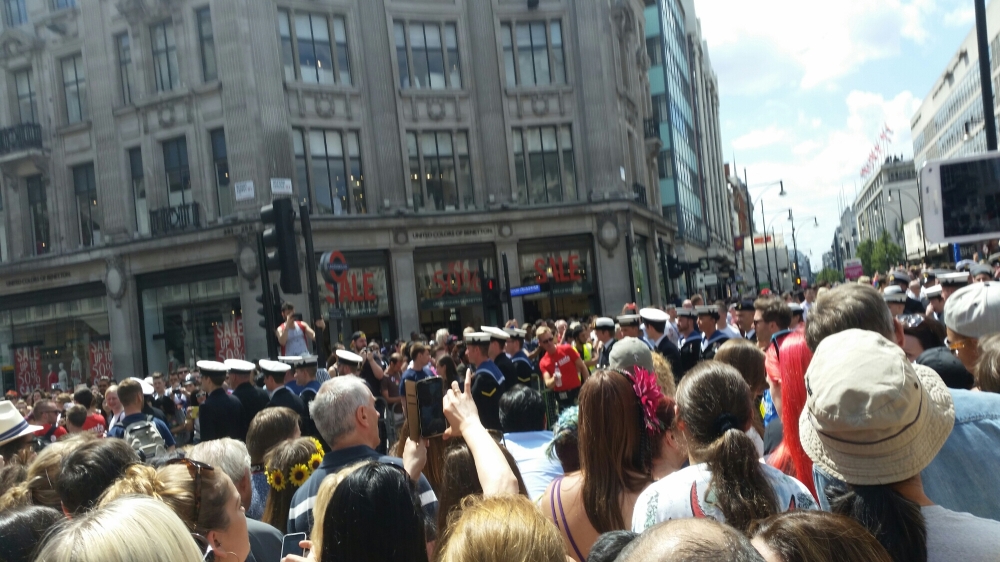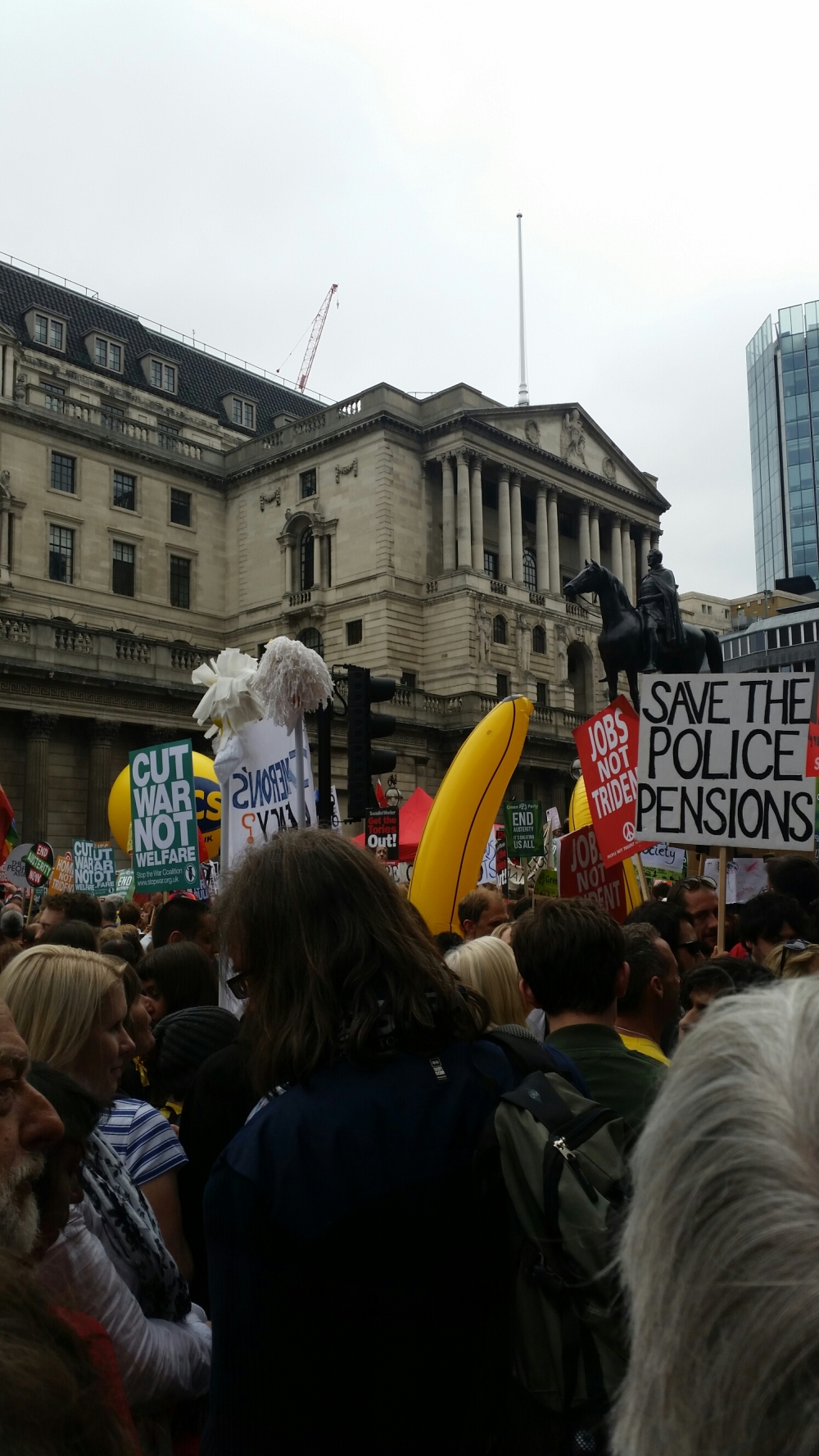London Pride 2015: who’s afraid of the rainbow?
There’s something very optimistic about a rainbow. It’s an image with many connotations; leprechauns and pots of gold, a sign from God, and of course the LGBT community. It is the championing of the rainbow by the latter group, however, which perhaps best reflects that aforementioned optimistic impulse.
A rainbow is vibrant, perhaps too vibrant for some, but this is precisely why it cannot be ignored. Furthermore, the rainbow of the LGBT community is more than just a colourful mascot, it represents the diverse spectrum of human sexuality and gender identity, which, like the original rainbow itself, is completely natural.
You may wonder why I am focusing so much on something which seems so self-evident. The truth is, I experienced some thinly-veiled homophobia recently which specifically involved the mockery of people drawing rainbows on their faces for the London Pride Parade on Saturday the 27th of June, and it’s got me thinking about those peppy little arches ever since.
I returned from a day in central London with a piece of rainbow cake as a souvenir, I treat I had bought from the Soho Hummingbird bakery which seemed rather apropos, though actually it’s a hallmark of the establishment and wasn’t actually related to Pride at all. It was this that first indicated to a certain someone what sort of apparently frivolous activities I had been getting up to that day. This person, who shall remain anonymous mostly for the sake of propriety, but also because they don’t really deserve any acknowledgement, then went on to say in a mocking baby voice:
“Let’s paint rainbows on our faces whilst people have died in Tunisia.”
This comment upset me on many levels, not least because it was spoken by an individual relaxing on a Saturday evening with a beer in hand, hypercritically implying that the Gay Pride Parade was disrespectfully frivolous in the face of a tragedy. Pride, in this person’s eyes, is not just reduced to an ephemeral and perhaps even immature past-time, but one which is offensive just for existing coincidentally not long after a terrorist attack in a different part of the world. Of course, these two events bear no relation to each other, and I hope it goes without saying that disrespecting the victims of the Tunisia attack is the last thing I want to do.
When I tried to point this out, I was met with the response, “well I suppose life goes on,” thus the person in question provided a perfect rebuttal to their own previous statement. Although I don’t usually see eye to eye with David Cameron, after the attack he urged people to live their lives as normal. Maintaining a daily habitus is essential in the face of terrorism because its aim is to incite fear and manipulate people. London Pride is not a usual daily occurrence by its very nature, but as a celebration of the diversity of human sexuality and gender identity, it reflects aspects of people which are very much quotidian. Furthermore, embracing human variety is a figurative middle finger to terrorism, and the warped ideals and prejudices that it represents.
When confronted with the reality that uncountable people have died just because they happened to be gay, this person simply stated that they “don’t care about them.” The idea that some lives are inherently worth more or less is incredibly toxic, and indicates just how deeply prejudice can run. To be made to feel guilty for supporting something which is essentially a celebration of human life by a person who elects to empathise only with people they can immediately identify with, demonstrates the kind of bleak irony that is so often infused in a homophobic outlook. If you profess to be compassionate and stand for social justice, the least you can do is to be aware of your double standards.
The Big Bad Rainbow
Now, I want to get back to that rainbow. The responses to it, I think, illustrate well the kind of contradictions at play in the prejudice against it as a gay rights symbol.
The mockery of it being painted on peoples’ faces, for example, stems from an association with the rainbow and childish, fairy tale scenes. The thing is, it’s true that a rainbow does conjure up the kind of camp stereotypes that are commonly associated with the gay community, and the notion of a ‘fabulous,’ ostentatious aesthetic. That’s fine, because the thing about a gay rights symbol is that you can identify with it however you see fit, even if that only extends to its intention as an inclusive image. In which case, to merely dismiss the Gay Pride rainbow as perhaps garish or immature is to miss the point of the symbol entirely. Also, just because London Pride included a wealth of colourful floats doesn’t mean it was a superficial and shallow event. The fact that there is a specific day when LGBT folks are not only allowed, but in fact expected to occupy space in central London is exemplary of the power of public events to not only increase the visibility of a group, but to disallow them being ignored or segregated to niche spaces.
In the Pride Parade, LGBT culture is not just out of the closet, it’s literally dancing in the street.
Of course, for all the homophobic killjoys out there, this is the height of offensive activity. How dare gay people be out in the open and having fun? Those who are casually homophobic but like to hide it behind the ridiculous justification of “I don’t mind it, as long as it’s not rubbed in my face,” must get really chafed heads from Pride. And let’s not even mention the whiplash they suffer from their bad case of Double Standards.
The idea that Pride is somehow a corrupting force also reflects back on peoples’ perception of the rainbow as a childish symbol. I’ve seen a tweet complaining how by appropriating this sign, LGBT people had tarnished a once ‘innocent’ piece of childhood imagery. However, what the LGBT pride rainbow represents isn’t a matter of innocence or otherwise. It is a matter of representing those who historically have not fit the status quo of cis gender heterosexuality, since even before such categories were firmly entrenched in common parlance. Now, in a 21st century world, this rainbow promotes wider visibility, which can only be a good thing. After all, people often fear what they don’t understand.
The rainbow is only a rainbow, and it’s probably not even a symbol that all LGBT people identify with. Yes, the rainbow is only a rainbow, but it is also a symbol with much more depth than just seven colours. That’s a contradiction that some may not be able to grasp, and that’s a shame, because all human life is full of contradiction.
Contextual privilege
Speaking of contradictions, let’s return to the idea that attending Pride is a privilege. When I was implicitly criticised for going to the parade in the aftermath of a terrorist attack, it appeared that to do so was to indulge in some decadent luxury. The thing is, in a global and historical sense, to be able to freely take part in such an event is a privilege. Living in a first world country in which it is illegal to discriminate on the basis of sexual orientation or gender identity, British people are privileged compared to those who have no legal safeguards (at least in writing, if not always in practise). Yet, the right to be lesbian, gay, bisexual or transgender is not a privilege. It is a fact of life for millions of people worldwide. When you understand that contradiction, you can see how important an event like Pride is. It is a privilege to attend in a relative sense, but absolutely, it is not. This is why Pride needs to be celebrated openly-it has a right to exist, and that right is precious.
I would also like to highlight another type of privilege, the one which homophobic and transphobic people experience. This is contextual privilege; the privilege of power, institutional or otherwise, or the social backing of others who will support and further perpetuate your prejudice. Luckily, the importance of this kind of privilege is waning. As the visibility and understanding of LGBT people increases, casual prejudice is more likely to be called out.
To even be prejudiced against any group is a luxury, and one that no one is entitled to.
The Monochrome Problem
Homophobia and other forms of prejudice, I think, are the product of a very particular type of thinking which daubs the world in black and white. Through the monochrome lens, all morality is absolute and there is no room for interpretation or acknowledgement of personal bias. Forget Fifty Shades of Grey-the world is actually an incredibly colourful place, albeit a confusing one. It’s no surprise that some find it easier to edit reality according to their insecurities, as if putting the world through some rather boring Intagram filter.
This is the Monochrome Problem. How dull it must be to only perceive existence through black and white. Yet this explains why some feel they are entitled to pass judgement on people who have nothing to do with them, and whose lifestyle has no direct impact on them. I dare say the same people who make it their personal vendetta to limit the agency of others would be irate if the state or some kind of pressure group tried to meddle in their affairs. Irony must be a difficult concept for those with the Monochrome Problem; it’s far too subtle a shade.
Everyone loves a tragic back story
Although it shouldn’t be necessary, I do feel a need to personally qualify this piece. You’ve probably already guessed why I’m so passionate about this particular issue, though I’m under no illusion that anyone is particularly interested in my sexual orientation.
I’m bisexual. This is something I hardly ever mention even in passing to anyone, ever. This is partly due to social awkwardness, but also through a fear of having to justify myself or of being ridiculed. Fortunately, I have a boyfriend who doesn’t bat an eyelid about this sort of thing, but I’ve had difficulty raising the subject even with people I’m very close to.
On two particular occasions at school, I was jeered at by other students in front of an entire class and the teachers present due to the perception I was a lesbian. I doubt anyone present remembers this apart from me, but the fact that even educational professionals just watched and wouldn’t intervene has haunted me ever since. As a teenager, I was convinced that this proved I was monster who deserved everything I got. I internalised the mockery and despised myself.
I am tired of being afraid of other peoples’ squeamishness of anything that doesn’t fit into the neat little box of their personal experience. I’m tired of censoring myself, of pretending I’m not hurt when someone is casually homophobic, or in particular, if female same-sex attraction is treated as a joke, a male fantasy or a farce for attention. Just because I’m different from the apparent ‘norm,’ doesn’t mean I’m invalid.
At the same time, my sexuality doesn’t really matter all that much, it’s just a fact of life. Until this simple concept is accepted, though, I’ll keep on writing pieces like this.
Are you afraid of the big bad rainbow? Do you want to live in a monochrome world? If so, good luck-bigotry ain’t what it used to be.







